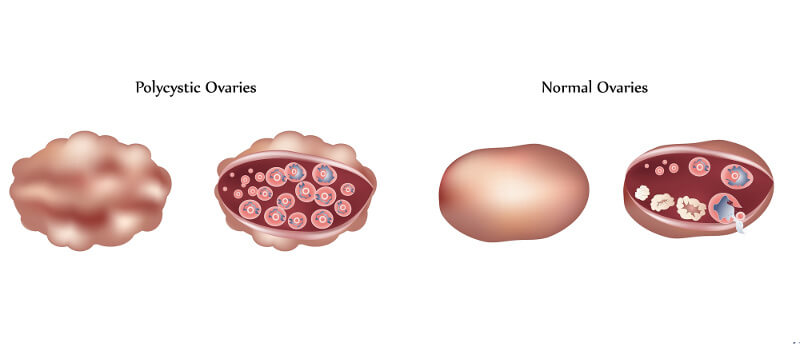What is Polycystic Ovary Syndrome (PCOS)?
PCOS is an acronym for Polycystic Ovary Syndrome. Polycystic ovary syndrome involves the abnormal growth of cysts on the ovaries. This results in hormonal imbalances and an inability to ovulate properly.
Normally, the ovaries produce a small amount of male sex hormones called androgens. When a woman has PCOS, the ovaries make slightly more androgens than normal.
An increase in testosterone is the key cause of the symptoms of PCOS, particularly facial hair growth, increased body mass and irregular menstruation. Most cases of PCOS are diagnosed, as it is a common cause of infertility. The body also has trouble using insulin, which causes blood sugar levels to increase. Over time, this can lead to diabetes.

Who can get PCOS?
6-8% of women of reproductive age in the US are affected by PCOS. It does not seem to affect one race more than another, but is at a higher prevalence among Indigenous Australians. Most women are diagnosed with PCOS during puberty when the symptoms begin.
What are the risk factors for PCOS?
There is a genetic component to PCOS, so having a family member who has already been diagnosed increases your chances of having it. Beginning puberty early (at age 10 or below), particularly developing pubic and underarm hair at a young age is also seen to be a risk factor for PCOS. Other weak risks include obesity and low birth weight.
What are the symptoms of PCOS?
There are a few characteristic signs of polycystic ovary syndrome, and not all of them exist in every patient. Some women have polycystic ovaries on ultrasound but do not exhibit any of the clinical symptoms.
-
Irregular menstruation
The definition of irregular menstruation is experiencing periods at intervals less than 21 days, or greater than 35 days. If you've noticed any changes to your cycle, or don't have a set cycle, this may be irregular menstruation. -
Infertility
One of the main consequences of PCOS is that the cysts on the ovaries disrupt the normal growth and maturation of eggs. This can cause infertility, as sperm cannot properly fertilize the eggs. Most women are diagnosed with PCOS after unsuccessful attempts at becoming pregnant. -
Hirsutism
If you've noticed thick, dark facial hair growth, particularly around your chin, upper lip or cheeks, this is known as hirsutism. It can also be noted around other parts of your body, particularly your chest, back, thighs and buttocks. -
Acne
15-20% of women with PCOS have acne, and it is usually severe and persists beyond adolescence. -
Overweight/obesity
Up to 80% of women with PCOS are classified as overweight or obese, and this is also attributed to the hormonal imbalances caused by the cysts. -
Oily skin or excessive sweating
All of these symptoms are due to an increased testosterone level caused by the cysts on the ovaries interrupting the normal hormonal changes.
How is PCOS diagnosed?
There are two methods for diagnosis of PCOS.
Blood tests will show high testosterone levels, and elevated levels of other hormones implicated in PCOS. This establishes the cause for the symptoms, however, raised testosterone can be due to hormonal imbalances other than PCOS, such as Cushing's Syndrome or thyroid problems.
An ultrasound can directly view the ovaries and determine whether cysts are present. Cysts are only visible in around 75% of women with PCOS, and are dependent on what time of the cycle the ultrasound is performed at.
These two tests together, along with the symptoms listed above can help to make a diagnosis of PCOS.
PCOS treatments
Depending on how PCOS is affecting your life, your doctor will adjust your treatment.
If you're having difficulty conceiving due to PCOS, the first line treatment suggested is weight loss if you are overweight.
Nutritional status and obesity have a huge impact on the ability to conceive and weight loss has been shown to be very successful in aiding conception.
Secondly, drugs that increase estrogen maybe given to increase the maturation and release of eggs. These include clomiphene and gonadotropins.
If after these pharmacological therapies are given, fertility cannot be achieved, a procedure called laparoscopic ovarian drilling can be utilized. This involves use of a laser to reduce ovary tissue, which encourages a better hormonal balance. If you aren't looking to have a baby, but are diagnosed with PCOS, treatment is mainly to remove the symptoms. The oral contraceptive pill is prescribed as a first line treatment and reduces testosterone in the body, which then reduces all of the symptoms, particularly the acne. This can take up to three months. Your doctor may also prescribe some creams to help reduce facial hair growth.
How can it be prevented?
There have not been any conclusive studies that demonstrate methods to prevent PCOS. Increased screening of females in families known to have PCOS is encouraged for early detection.
What are the consequences?
The main consequence of PCOS is infertility. Most women with PCOS are affected by infertility due to the lower rate of ovulation. As outlined above, treatments do exist to help women with PCOS conceive.
Some complications can occur during pregnancy, particularly if the mother is obese. There is an increased incidence of miscarriage in women with PCOS during pregnancy, as well as an increased rate of gestational diabetes, preterm delivery and pre-eclampsia.
Women with PCOS also have a 3 times increased risk of contracting Type 2 Diabetes in their lifetime.








